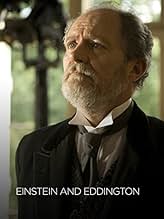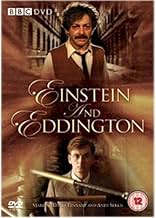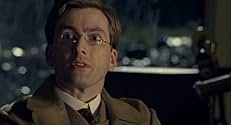Agrega una trama en tu idiomaDrama about the development of Albert Einstein's theory of general relativity, and Einstein's relationship with British scientist Sir Arthur Eddington, the first physicist to experimentally ... Leer todoDrama about the development of Albert Einstein's theory of general relativity, and Einstein's relationship with British scientist Sir Arthur Eddington, the first physicist to experimentally prove his ideas.Drama about the development of Albert Einstein's theory of general relativity, and Einstein's relationship with British scientist Sir Arthur Eddington, the first physicist to experimentally prove his ideas.
- Nominada a1 premio BAFTA
- 5 nominaciones en total
- Tennis Player 1
- (as Ben Uttley)
- Dirección
- Guionista
- Todo el elenco y el equipo
- Producción, taquilla y más en IMDbPro
Opiniones destacadas
Both Einstein and Eddington wrote numerous books for the general public, and I read most of them when I was young. I was familiar with the famous 1919 astronomical expedition to test Einstein's General Theory of Relativity by measuring the position of Mercury during an eclipse, and even read old newspaper accounts from the archives, including the comments by Alfred North Whitehead. And I have read books on the history of science.
Yet I never knew about the context in which General Relativity was developed, both historical and personal. Now, in light of this program, it seems obvious: General Relativity was published in 1916, during the first World War. The Eddington expedition to measure Mercury occurred in 1919, shortly after the war ended. And yet, when we learn about science we assume that it rises above politics and conflicts like war and national pride, as though existing in another world.
What we see in Einstein and Eddington is that it does not. Politics and national pride played central roles, and it is only through individuals resisting social pressure that it does, actually, rise above transient political bias. Specifically, Britain's national pride was closely tied with Newtonian physics. Germany's national pride could be enhanced by having a scientist of their own overthrow Newton, namely Einstein. But both Eddington -- who, as director of the Cambridge Observatory was viewed as a protector of Newton's law of gravity -- and Einstein believed loyalty to scientific truth transcended national chauvinism.
These principles were put to the test as much as Einstein's theories because of the ongoing war between Britain and Germany. In Eddington we have a Quaker and true pacifist, and in Einstein we have a not terribly devout Jew who also does not believe in war, and wrote pacifist essays later in life. However, to say Einstein did not believe in God is mistaken, just not the anthropomorphic, personal God. This film brings out the curious parallels between the two scientists.
According to the film, it was a letter from Eddington prodding Einstein to use his Theory of Special Relativity to explain the anomalous orbit of Mercury that put Einstein on the road to writing his Theory of General Relativity, published in 1916. An examination of the dates of publication of his works in the intervening years suggests this is probably misleading -- say a literary device, though I am not sure; the chronology of events in the movie are vague. By 1911 he had already calculated that light from a star would be bent by the sun's gravity -- which was proved correct by Eddington's 1919 expedition. At any rate, Eddington should have had several other journal articles by Einstein to read.
This simplification of the story can be forgiven because the film does such a good job of conveying for the layman several concepts of relativity, particularly gravity bending space. An intelligent person should be able to follow this film. But a little more scientific context would have been helpful for novices.
There are many layers to this film, one being the invention of weapons by German scientists, which outrages both Einstein and Eddington's British colleagues. Yet, Einstein's General Relativity laid the foundation for the ultimate weapon.
I'm not sure the film precisely captures the character of the young Einstein, but it comes close. More recent biographies have told about Einstein's relations with women, and that he was sometimes, shall we say, manipulative. So it is good to show him as a human being. He was always a non-conformist, especially in his later years, when he could afford to be. The bit at the end with him going before the press looking disheveled was silly, and the shot of him sticking out his tongue was from many decades later. But chalk it up to literary license.
I was also annoyed by the snide comment about Eddington's irrelevancy at the end of the film. Eddington did solid, respected science and was very famous, the Carl Sagan of his time. It's been a century since the period presented in this film, and few scientists remain household names that long. Eddington was an early astrophysicist and one of the first cosmologists, so he was a pioneer who laid the groundwork for so much that we read about in the press today. It is a fine thing this film brought him back into public view.
It would have been nice if the actors could have pronounced Max Planck's name correctly. And why do the British kill animals on screen so often? It's very disturbing, especially for children.
What really bugged me about Einstein and Eddington was the goofy camera work by Julian Court. I can see hand holding the camera outside while moving, but inside while the actors are sitting at a table talking? If you can't hold a camera steady, put it on a tripod! It sure looked like they were jerking the camera up and down unnecessarily during static scenes, unless the camera had Parkinson's. This is not MTV or youtube; it is not even one of those wacky National Geographic documentaries.
This is an historical science drama, and it should have been treated with the appropriate polish. The jerky camera movement was distracting from the concentration needed to follow the ideas being presented. Aside from that, this docudrama really held my interest throughout. So one point off for the camera work, one point off for killing animals; otherwise, a 10.
Many of the works that Eddington and Einstein wrote for the layman are still worth reading today, and do not require prior science courses. Eddington's honest examination of philosophical questions related to science, particularly between consciousness and the physical universe, are still relevant. Eddington was among the best at explaining science and cosmology to the general public, and I think he would have been delighted by this film.
All the standard ingredients are there; nasty German scientists devoted to anti-personnel gas production, stiff old aristocrats interfering with progress and our two cool dudes strutting around their patches telling everyone what's what. But it's not just about giving the Krauts another bashing. Once again the Studios give us a spoon fed morality session with stereotypical bad guys looking like greasy bankers, sold out scientists and pompous officials waging senseless war for their own profit and power. (If only life was that clear cut) Meanwhile the good guys, Eddington and Einstein, are both above the mass killing. Their search for truth is a shining example of how the individual can change the world - or so Eddington tells us in a much edited final speech that could have been written by Thatcher.
The sheer banality of the script is enough to bend space itself. Max Plank makes a stage entrance so contrived that even the Cleethorpes Junior School Drama Society would be embarrassed to stage it. We are treated to Einstein the improvised clown who leaps from boats explaining relativity to knee high children. Then he becomes a disheveled dropout who goes around demanding that the German authorities stop their gas campaign. Once again Hollywood takes 21st century man and sticks him into 19th.century society and once again it doesn't work. Our Einstein is so profoundly rude and abusive to the authorities that you know exactly which century he comes from.
Of course David Tenant as Eddington is superb. Had he not been in the show I don't think I could have stuck it out and written this review. Watch this if you have a crush on him or an obsessive interest in Einstein. But don't expect to learn anything about 'Einstein the Man' in this movie for it was one of the worst pieces of casting and scripting that I've ever had the misfortune to endure.
¿Sabías que…?
- TriviaAlbert Einstein's character is seen throwing his socks upon the crowd on a dock early in the movie. However, he never wore socks into adulthood in real life due to their propensity to make holes in the big toe.
- ErroresOne the night before the total eclipse of the Sun, a full moon is shown in the sky. That is impossible since a solar eclipse can only occur at the time of a 'new Moon', i.e. when the Moon is the opposite to being full.
- Citas
[Einstein is trying to work out why Newton's Laws of Motion do not correctly explain the orbit of the planet Mercury]
Max Planck: May I ask you a very serious question? What if God were to say you were mistaken? If he said "Stop. Newton is right"?
Albert Einstein: Then I would thank God for his point of view, and we would agree to differ, and I would be left feeling very sorry for God.
- ConexionesReferenced in Parkinson: Episode dated 5 May 2007 (2007)
Selecciones populares
Detalles
- Fecha de lanzamiento
- Países de origen
- Idioma
- También se conoce como
- Einstein và Eddington
- Locaciones de filmación
- Fót Studios, Budapest, Hungría(Eddington's office)
- Productoras
- Ver más créditos de la compañía en IMDbPro
Contribuir a esta página




































